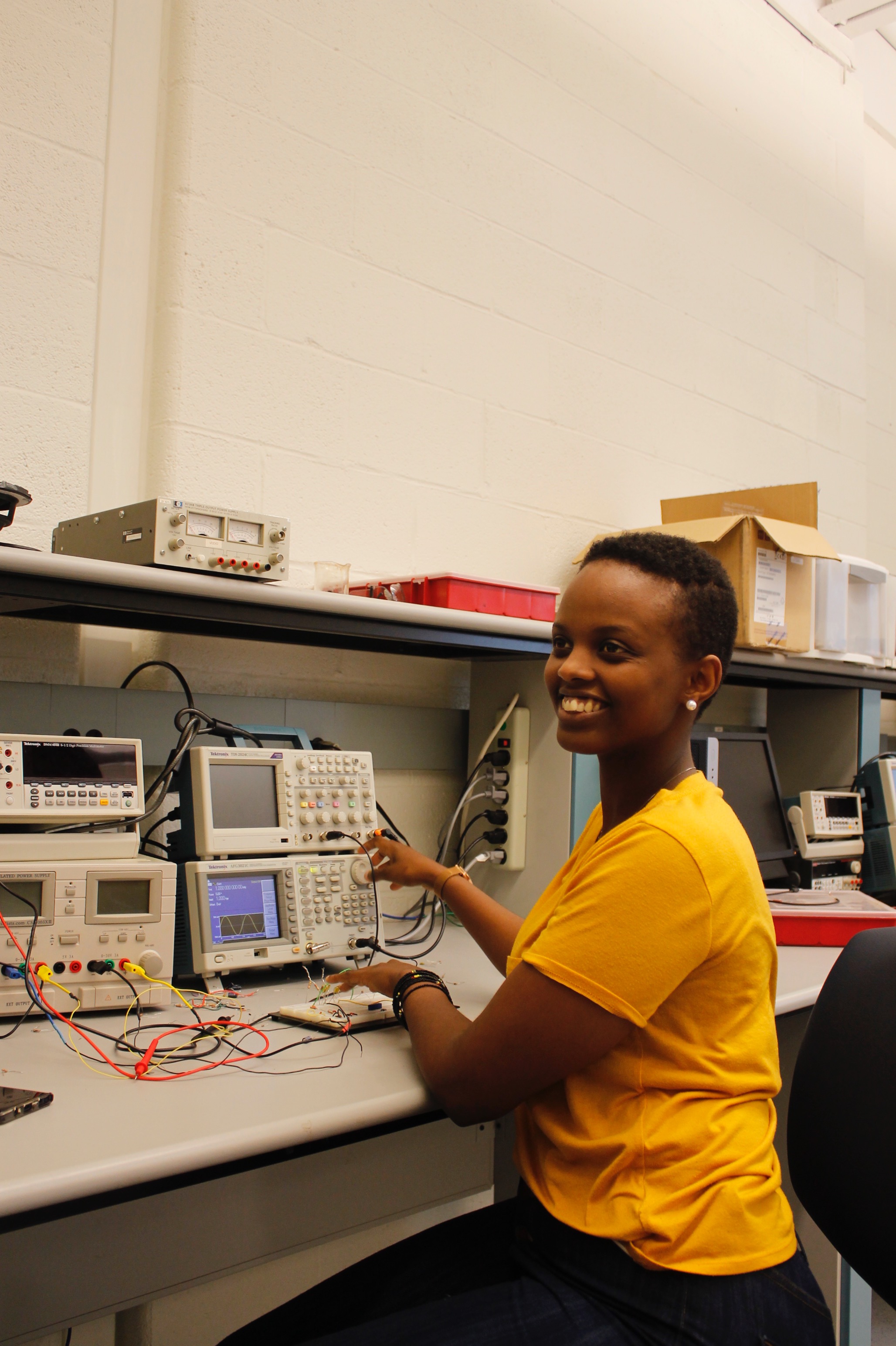By: Lillian Lema, Staff Writer
The student body and faculty walks around with their smartphones in hand and laptops in their backpacks. They ride the elevator. They drink out of the water fountain. All of these tools are a part of everyday life. Most don’t think of how these objects are made, but an engineer does.
When it comes to explaining the role of an engineer, Gisele Mukundwa said, “solving problems using your math and science knowledge is the simplest way I can define the role of an engineer… every machine or device we use was designed by an engineer… they are the masterminds behind almost every piece of technology available to us.”
Mukundwa is a senior majoring in electrical engineering. At 18 years, Mukundwa, left her home country of Rwanda with her family and moved to Utah. While in Utah, Gisele had to repeat her senior year of high school because she didn’t know how to speak English very well.
“Back home we studied English,” Gisele states, “but we would only speak it in the classroom while we were learning it and then we would go back to speaking our language.”
After living for a year in Utah, Mukundwa moved to Maine. Soon after, she enrolled for the fall 2015 semester at Southern Maine Community College, where she started off as a biotech major.
However, once in the program she realized she was “not a biology person” and had doubts about the field. Instead of giving up, she switched her major to liberal studies, which gave her a chance to explore more classes.
“Giving up was not an option,” Mukundwa said, “I knew I wanted to become an engineer, so I took classes within different engineering fields, and my circuits classes stood out to me the most.”
In spring 2017, she graduated from SMCC with an Associates in science/pre-engineering. That fall, Mukundwa began her academic career at USM. She enrolled as an electrical engineer major.
Her love for math, science and knowing how things work are the key reasons she is intrigued with electrical engineer.
“In today’s world, everything is becoming electrical,” Mukunda said.
Mukundwa had doubts about her major and her abilities as a student. The fears of going into engineering for Mukundwa dealt with doubting if she would get a job in the field, how she would deal with language barrier challenges in a field that requires a lot of communication skills. She wondered if she was good enough.
She felt her classmates who grew up here in America had an advantage over her.
“People grow up here, in America, with all this technology and sources available to them,” Mukunda states. Back home in Rwanda, she describes there being one computer lab, a bit smaller than Luther Bonney’s computer lab, that would fit one class of about 25 to 30 students.
“This lab was our only source of computers at our boarding school,” Mukundwa explains.
Besides those concerns, she also thought that people here in America were better in all other aspects, such as tech-savvy, communication, smarter, and privileged.
Now, as a senior at USM, Gisele has realized that one of the biggest lessons she has
learned is that “fake knowing” isn’t going to get you far. Mukundwa describes “fake knowing” as
“trying to make it seem to everyone that you know what you are doing and talking about.” Mukundwa said, “there are ethics involved… we are creating things that will affect people’s lives so we can’t pretend we know how to do our jobs.”
During an internship interview, Mukundwa had written down on her resume that she had learned about circuits. When the interviewer told her to solve the circuit written on the board, she froze.
“I have learned about circuits, but the one on the board I couldn’t remember how to solve it. My mind went blank,” Mukundwa said. “That is when I realized ‘faking it until you make it’ wasn’t going to work in this field.”
Since then, Mukundwa has been active in gaining more experience in the electrical
engineering field. She is currently a design analysis of biosafety cabinets intern for The Baker Company.
Earlier this past summer, Mukundwa volunteered for STEM Sisters, where she explained the basics of circuits to middle school students.
“If I could give the Gisele from 2 years ago advice it would be that not everyone knows everything… and that’s okay… if you don’t know something, ask questions,” Mukundwa said.
For Gisele Mukundwa, the drive to continue to become more knowledgeable in her field has to do with the fact that she applies what she learns into creating a better tomorrow.
“We get to make the world a better place and make life a little bit easier for people.”

